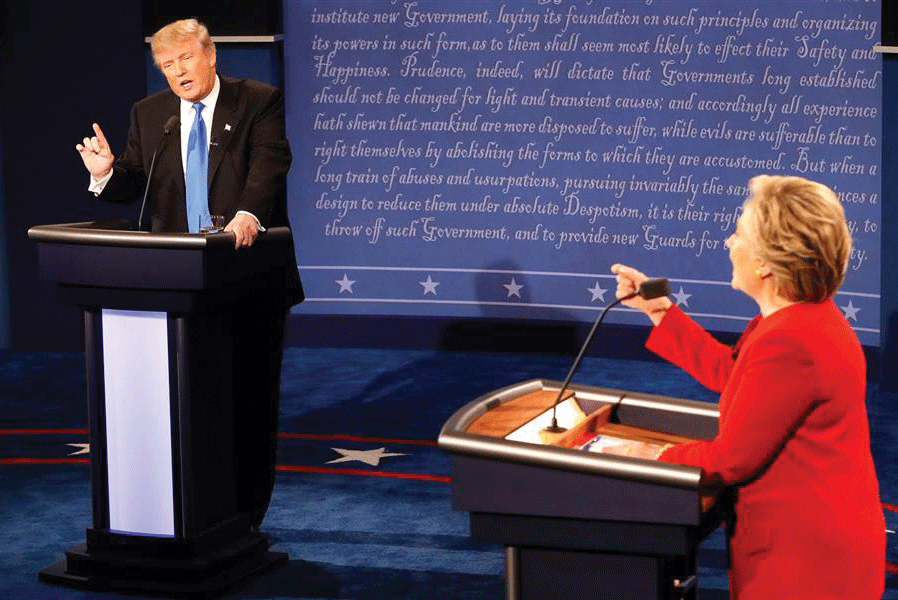Clinton and Trump Face-Off in First Presidential Debate
Donald Trump and Hillary Clinton met at Hofstra University for the first of several scheduled debates. The next debate will be on Sunday, October 9.
The first Presidential Debate aired on the national news outlet NBC News on Monday, September 26. The debate was the first head-to-head discussion between presidential candidates Hillary Clinton and Donald Trump, and was moderated by NBC News anchor Lester Holt.
The primary point of tension of the debate was Trump highlighting Clinton’s 30-year career in politics and her inability to achieve anything during her career. Trump also accused her of only acting now that he and his supporters have “created a movement” pushing for change, and presented himself as a savvy businessman and an alternative to status-quo politicians.
Clinton labeled Trump’s economic plan as “trumped-up, trickle down” economics, which she argued would invariably favor the upper class in the United States. Clinton instead proposed policies to make the “wealthy pay their fair share,” which she accused Trump of not doing, claiming he has not paid income taxes in years. She then demanded that he release his tax returns, something he has not yet done. Trump responded that he would release his tax returns when Clinton released her emails.
“The wealthy are going to create tremendous jobs,” Trump said of his plan to reduce taxes on all companies from 35 percent to 15 percent as an incentive to foster growth and job creation. He also argued that this would help stop jobs from going to places like Mexico and China.
The candidates also debated the issue of race. Both noted the need for improved relations between communities and law enforcement, although Trump and Hilary proposed two very different plans to achieve this. Trump focused on the need for law and order and the lack of safety in inner cities, noting that he had been endorsed by the Fraternal Order of Police. Clinton called for criminal justice reform and the need for gun control, also proposing the reservation of funds in her first budget to retrain police officers on the issue of implicit biases.
When the candidates turned to issues of foreign policy, Clinton questioned Trump’s support of the war in Iraq and Trump accused Clinton of fighting ISIS for her “entire adult life.” They then bickered about whether or not Trump supported the invasion of Iraq, to which Trump was adamant that he did not.
There were also moments of agreement for the candidates, however. Both concurred that people on the no-fly list should not have access to guns. They agreed that cyber security and warfare are important issues at the moment, even though they disagreed on who the biggest cyber threats were; Trump cited ISIS and Clinton cited Russia. They also agreed that nuclear weapons were a great threat to security, although Clinton argued that Trump should not be trusted with the responsibility that comes with the United States’ nuclear arsenal.
Sophomore Will Laud shared his thoughts on the first debate, stating that both candidates expressed their opinions in unconventional ways.
“I’m not sure it was a debate so much as a reality TV show; Hillary showed her usual preparedness, Donald showed he had great material for Alec Baldwin [who parodied Trump on Saturday Night Live],” Laud said. “He came out strong, slamming her on [the] Trans-Pacific Partnership (TPP), but lost steam soon after that, failing to mention many specifics and failing to prove he prepared for the debate. The Donald may have done slightly better than many papers give him credit for, but I’m not convinced he impressed any voters. Hillary let him talk and talk, which was a brilliant move on her part, [as] he showed he did not have the depth of knowledge or political savvy to upset her in polls.”
Senior Frankie Flores indicated that he believed that Trump performed well during the debate.
“I believe that Trump had an extraordinary first 30 minutes of debating compared to Hillary’s performance, but this was problematic for the 90-minute debate,” Flores said. “He started to spiral on the topics of his business record and Iraq, particularly crying Hannity every time his position was rebutted. Although I don’t believe he lost the debate, I also don’t believe he won.”
Senior Taylor Ellerkamp had a more definitive view on the outcome of the debate.
“I thought that Secretary Clinton’s answers to the debate questions showed more maturity, knowledgeability and preparedness than Mr. Trump’s did,” Ellerkamp said.
President of College Democrats senior Bryan Dewan voiced his agreement.
“The debate highlighted how much better prepared Hillary Clinton is for the presidency, evidenced by her thorough debate preparation,” Dewan said. “While Trump yelled, interrupted and bullied his way through the debate in order to mask his underlying lack of policy knowledge, Clinton’s calm confidence displayed a deep level of preparation and understanding which Trump couldn’t match.”
President of College Republicans junior Drew Derrenbacker added his insight as well.
“I thought both candidates began the debate strong and focused on policy,” Derrenbacker said. “The second half, however, centered around superficial personal attacks, and ‘gotcha’ politics. It will be interesting to see how each candidate makes adjustments for the second debate.”







